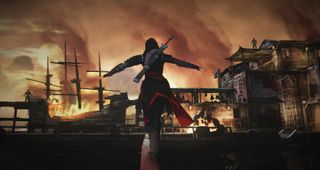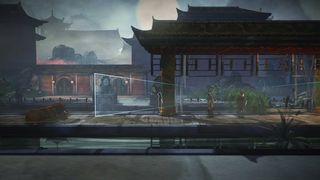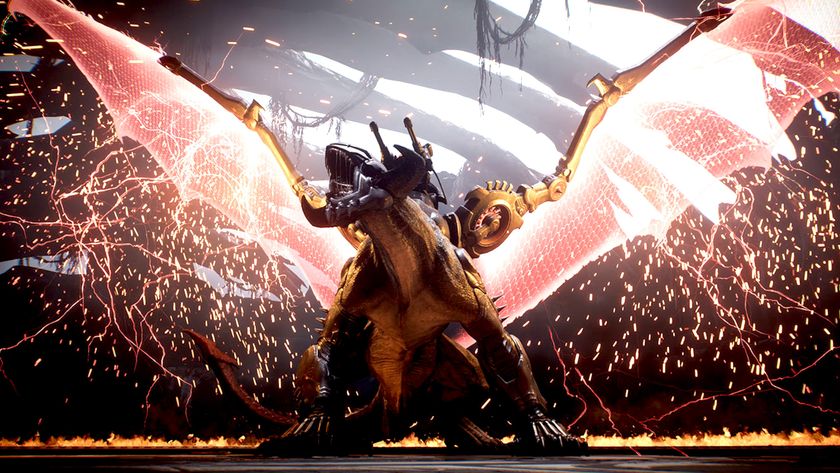GamesRadar+ Verdict
Though it sheds many of the series' best elements, Assassin's Creed Chronicles: China has its own charm, and is worth a play for those in search of a simple stealth experience.
Pros
- +
Beautiful visuals and environments
- +
Meaningful challenges with worthwhile rewards
- +
Still feels like an Assassin's Creed game
Cons
- -
Little exploration and no free-roaming
- -
Uninteresting story and lack of character development
- -
Finicky controls that can spoil a mission
Why you can trust GamesRadar+
With every new iteration, the tangled ball of plot threads that is Assassin's Creed gets a little more complicated. Given that its overarching story covers all of human history, from primordial ooze to Oculus mind-reading, the series can sometimes be a challenge to mentally juggle. This is a situation that the development team is clearly aware of, which has resulted in an effort to consolidate the extended canon into game-form, and give players a breather with some smaller, more bare-bones titles. That's the aim of the new Assassin's Creed Chronicles mini-series, and the first in the set, China, brings us to the Great Wall and Forbidden City. While the title does discard some great parts of the Assassin's Creed experience, and controls can be frustratingly finicky, it's still well worth a try for stealth aficionados looking for a clear-cut challenge.
Assassin's Creed Chronicles: China follows the tale of Shao Jun, a Chinese Assassin first introduced in the Assassin's Creed Embers short film as the last student of Ezio Auditore. Her tale in Chronicles: China mirrors that of her master in many ways - a young upstart plots revenge against the Templars for the murder of those close to her - and doesn't get much more complex than that. Here the plot is largely a framework for the gameplay to rest in, so we know why Shao Jun is headed from point A to kill person B. That set-up also leaves Shao Jun as little more than an avatar to be moved around the screen, and much of the personality she exhibited in Embers is abandoned for the sake of brevity. That's unfortunate for fans interested in an engaging narrative and character development, as there isn't much of that to be found here.
That focus on simplicity extends to the rest of the game as well, though the result is much more favorable in terms of gameplay. A 2.5D side-scroller, Chronicles: China sees Shao Jun navigating a series of beautifully rendered 16th century Chinese locales on a 2D plane, with foreground and background areas accessible in context-sensitive situations. In most sequences, the goal is to sneak through a given area past a series of increasingly hyper-aware guards using hidden nooks, unwatched areas, and distraction devices like noise darts and firecrackers.
That setup threatens to become suffocating over time, so the game intermittently reduces tension with a free-running mode, where you abandon all caution and race through a lethal obstacle course as it disintegrates around you. Together these two modes balance each other out, so it rarely feels like you're doing any one thing for too long. Granted, the running sections can occasionally feel shoehorned in, but they make up for it by acting as a reward in their own right. Yes, Shao Jun could have avoided racing through a burning harbor if she'd simply hidden her target's body better and kept his comrades from going on a torch-happy hunt for her until she was well out of harm's way. But running for her life and doing a Leap of Faith into the ocean as everything behind her explodes? That's a lot more fun.

While it's difficult to imagine the mechanics of the open-world Assassin's Creed series working well in this format, elements like sneak attacks, hiding places, and free-running convert beautifully into 2D while still being simple to use. Given that Chronicles' two main modes involve dodging hostile forces and running away from fire, these abilities are easily the most important, and thankfully work the best. There's a trade-off there though, since the format offers basically no exploration or free-roaming, and the vast landscape of China is reduced to a few lovely backgrounds and buildings to run over. But if you're more interested in guard-stabbing and vision-cone dodging than exploration, Chronicles' setup is a perfect fit.
Chronicles also departs from convention by making the points you receive for performance useful for progression. Main series entries assign high scores for completing a mission in a specific way and give you kudos for achieving 'full synchronization'; Chronicles, on the other hand, gives you a score based on how gracefully you perform a mission and uses those scores to determine what upgrades you get. That change makes careful execution feel much more worthwhile, because you're rewarded for it with something more substantial than a digital thumbs up. Admittedly this setup could prove frustrating for players uninterested in a challenge, since missing out on upgrades like increased projectile allotment can make the next level a whole lot harder. Still, the experience is a lot meatier for the inclusion of this goal-based system, and it feels pretty good when that gold assassin logo signals a job well done.

While Chronicles' does a good job of integrating that goal system, other aspects of play aren't as well executed, particularly in regard to control scheme. Chronicles does manage to dodge some of the handling issues common to AC games, given that it doesn't deal with fast movement in a 3D space and you're much less likely to run up a wall by accident. However, those problems aren't completely gone, as pushing the joystick a little too hard with cause Shao Jun will slide haphazardly in and out of cover and climb into a guard's line of sight when you didn't want her to.
That's a pretty substantial problem, since a single slip-up can mean getting caught by an entourage of guards and blown off the map. And you will be, because while combat is an option and you can brute-force your way past enemies, facing more than two opponents is a virtual death sentence given Shao Jun's low health count. Thus you have a game that heavily favors stealth and demands tight controls but doesn't always offer them up, so even sequences that should be simple can result in immense frustration.

Overall, Chronicles feels like something of an Assassin's Creed puzzle pack, which could be good or bad depending on what you go to the series for. If you're a lover of outlandish conspiracy theories, character-focused adventures, and gigantic worlds to explore, Chronicles will leave you wanting. But if you're into straightforward missions that challenge your strategic abilities and reward your skill with a high score at the end, Chronicles has everything you want wrapped up in an aesthetically-pleasing package. It may not be the next great Assassin's Creed title, and it probably won't satisfy fans of Shao Jun or players dying to take a Leap of Faith off the Temple of Heaven. But as a quick and dirty challenge pack, Chronicles gets the job done efficiently and with a hint of visual flare.
This game was reviewed on PS4.
More info
| Description | It's time for assassins to make their message heard in China. |
| Franchise name | Assassin's Creed |
| Platform | "Xbox One","PS4","PC" |
| US censor rating | "Teen","Teen","Teen" |
| UK censor rating | "","","" |
| Release date | 1 January 1970 (US), 1 January 1970 (UK) |
Former Associate Editor at GamesRadar, Ashley is now Lead Writer at Respawn working on Apex Legends. She's a lover of FPS titles, horror games, and stealth games. If you can see her, you're already dead.

Furiosa and Avatar star's new action sci-fi movie breaks Apple TV Plus records, becoming its biggest movie premiere ever

"A fun example of a bug becoming a feature": Destiny 2 accidentally made Exotic Glaives free to all classes, and Bungie says "we're going to let this ride"

As if hell and demons weren't enough, Doom: The Dark Ages went medieval so id Software "could get more dark and sinister with the tool kit"
Most Popular




